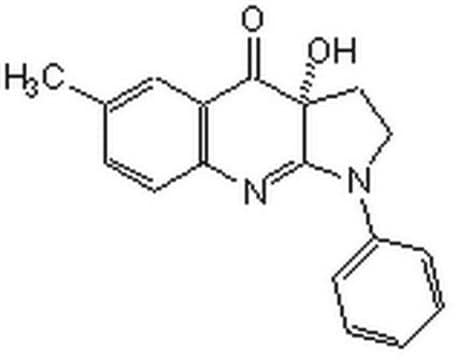203391
(-)-Blebbistatin
≥98% (HPLC), solid, ATPase inhibitor, Calbiochem®
Synonyme(s) :
(-)-Blebbistatin
About This Item
Produits recommandés
product name
(-)-Blebbistatin, The active enantiomer of (±)-Blebbistatin that accounts for the inhibitory activity towards ATPase and myosin II-dependent cellular processes.
Niveau de qualité
Pureté
≥98% (HPLC)
Forme
solid
Puissance
2 μM IC50
Fabricant/nom de marque
Calbiochem®
Conditions de stockage
OK to freeze
protect from light
Couleur
yellow
Solubilité
methanol: 1.5 mg/mL
100% DMSO: 100 mg/mL
90% DMSO: 75 mg/mL
Conditions d'expédition
wet ice
Température de stockage
−20°C
InChI
1S/C18H16N2O2/c1-12-7-8-15-14(11-12)16(21)18(22)9-10-20(17(18)19-15)13-5-3-2-4-6-13/h2-8,11,22H,9-10H2,1H3/t18-/m1/s1
Clé InChI
LZAXPYOBKSJSEX-GOSISDBHSA-N
Description générale
Actions biochimiques/physiologiques
Conditionnement
Avertissement
Reconstitution
Autres remarques
Shu, S., et al. 2005. Proc. Natl. Acad. Sci. USA102, 1472.
Kovacs, M., et al. 2004. J. Biol. Chem.279, 35557.
Straight, A.F., et al. 2003. Science299, 1743.
Informations légales
Code de la classe de stockage
11 - Combustible Solids
Classe de danger pour l'eau (WGK)
WGK 3
Certificats d'analyse (COA)
Recherchez un Certificats d'analyse (COA) en saisissant le numéro de lot du produit. Les numéros de lot figurent sur l'étiquette du produit après les mots "Lot" ou "Batch".
Déjà en possession de ce produit ?
Retrouvez la documentation relative aux produits que vous avez récemment achetés dans la Bibliothèque de documents.
Notre équipe de scientifiques dispose d'une expérience dans tous les secteurs de la recherche, notamment en sciences de la vie, science des matériaux, synthèse chimique, chromatographie, analyse et dans de nombreux autres domaines..
Contacter notre Service technique








